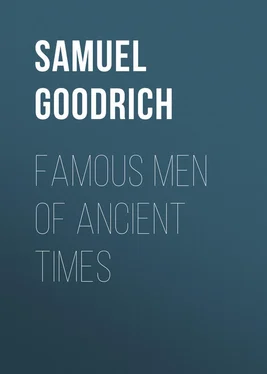Samuel Goodrich - Famous Men of Ancient Times
Здесь есть возможность читать онлайн «Samuel Goodrich - Famous Men of Ancient Times» — ознакомительный отрывок электронной книги совершенно бесплатно, а после прочтения отрывка купить полную версию. В некоторых случаях можно слушать аудио, скачать через торрент в формате fb2 и присутствует краткое содержание. Жанр: foreign_prose, на английском языке. Описание произведения, (предисловие) а так же отзывы посетителей доступны на портале библиотеки ЛибКат.
- Название:Famous Men of Ancient Times
- Автор:
- Жанр:
- Год:неизвестен
- ISBN:нет данных
- Рейтинг книги:5 / 5. Голосов: 1
-
Избранное:Добавить в избранное
- Отзывы:
-
Ваша оценка:
- 100
- 1
- 2
- 3
- 4
- 5
Famous Men of Ancient Times: краткое содержание, описание и аннотация
Предлагаем к чтению аннотацию, описание, краткое содержание или предисловие (зависит от того, что написал сам автор книги «Famous Men of Ancient Times»). Если вы не нашли необходимую информацию о книге — напишите в комментариях, мы постараемся отыскать её.
Famous Men of Ancient Times — читать онлайн ознакомительный отрывок
Ниже представлен текст книги, разбитый по страницам. Система сохранения места последней прочитанной страницы, позволяет с удобством читать онлайн бесплатно книгу «Famous Men of Ancient Times», без необходимости каждый раз заново искать на чём Вы остановились. Поставьте закладку, и сможете в любой момент перейти на страницу, на которой закончили чтение.
Интервал:
Закладка:
A fine of three hundred pounds weight of gold was levied upon the property of Belisarius, and he was suffered for many months to languish in obscurity. In 544, however, he was appointed to the command of the war in Italy, whither he soon proceeded. Here, in his operations against far superior forces, he displayed the same genius as before, and in February, 547, he again entered Rome. He pursued the war with various fortune; but at last, finding his means entirely inadequate to the necessities of the contest, he begged of the emperor either reinforcements or recall. Engrossed by religious quarrels, Justinian took the easier course, and adopted the latter. Thus, after having desolated Italy with all the horrors of war for several years, he now abandoned it, from mere weakness and caprice.
Belisarius returned to Constantinople, and for several years his life affords no remarkable occurrence. He continued in the tranquil enjoyment of opulence and dignities; but, in the year 559, various warlike tribes beyond the Danube, known under the general name of Bulgarians, marched southward, and desolated several provinces by sword, fire, and plunder. Zabergan, their enterprising leader, having passed the frozen Danube in the winter, detached one portion of his army for the pillage of Greece, and the other against the capital.
So sudden and bold an aggression filled Constantinople with helpless and despairing terror. The people and the senators were agitated with fear, and the emperor sat trembling in his palace. In this general confusion and affright, all eyes were turned with hope to the conqueror of Africa and Italy. Though his constitution was broken by his military labors, his heart was alive to the call of his country, and Belisarius prepared to crown his glorious life by a last and decisive battle. He resumed his rusty armor, collected a handful of his scattered veterans, and in the return of martial spirit he seemed to shake off the weakness of decrepitude.
Sallying from the city with three hundred mounted men, he met Zabergan at the head of two thousand cavalry. Selecting a favorable position, he withstood the onset, and, seeming to recover the powers of his youth, he astonished all around him by his intrepidity and skill. After a severe and bloody struggle, the Bulgarians were driven back in the utmost disorder; four hundred fell on the field, and Zabergan himself escaped with difficulty. The whole army of barbarians, amounting to many thousands, were seized with contagious fear, raised their camp, and retreated to the north.
Belisarius was preparing for a close pursuit, when again his enemies awaked the suspicions of Justinian by suggesting that he was aiming at popular favor with disloyal views. The enthusiastic praises of his heroic conduct, by the people, turned even the emperor's heart to jealousy, and he chose rather to purchase the departure of the barbarians by tribute, than to permit Belisarius to obtain new laurels by chastising their audacity.
From this period, Belisarius continued under the displeasure of Justinian, whose suspicious temper seemed to grow more virulent as his faculties sunk in the dotage of years. In 563, several conspiracies against the life of Justinian were detected, and under torture, some of the domestics of Belisarius accused their master of participation. This testimony, disproved by the long life and the habitually submissive loyalty of Belisarius, was sufficient for his conviction. He was stripped of his fortune, deprived of his guards, and detained as a close prisoner in his palace.
The other conspirators were condemned and executed; but, in consideration of the past services of Belisarius, the decree of death was changed for that of blindness, and his eyes were accordingly put out. 3 3 This portion of the story of Belisarius has been the subject of controversy. It has been doubted by Gibbon and other historians, whether the infliction of blindness upon Belisarius and his beggary, were not mere traditionary fables. But Lord Mahon, in his excellent life of the great Roman general from which we have drawn the preceding account, appears to have established their authenticity. The beautiful tale of Belisarius by Marmontel, is fictitious in many of its details.
He was now restored to liberty, but, deprived of all means of subsistence, he was compelled to beg his bread before the gates of the convent of Laurus. There he stood with a wooden platter which he held out for charity, exclaiming to the passers-by, "Give a penny to Belisarius the general!"
The affecting scene was long impressed upon the recollection of the people; and it would seem that this spectacle of persecuted merit aroused some dangerous feelings of indignation and pity, and he was, therefore, removed from public view. Belisarius was brought back to his former palace, and a portion of his treasures was allotted for his use. His death, which was doubtless hastened by the grief and hardships of his lot, occurred in 565; and Antonina, who survived him, devoted the remains of her life and fortune to the cloister.
In person, Belisarius was tall and commanding; his features regular and noble. When he appeared in the streets of Constantinople, he never failed to attract the admiration of the people. As a military leader, he was enterprising, firm, and fearless. His conception was clear, and his judgment rapid and decisive. His conquests were achieved with smaller means than any other of like extent recorded in history. He experienced reverses in the field; but never did he fail without strong and sufficient reason. His superior tactics covered his defeats, retrieved his losses, and prevented his enemies from reaping the fruits of victory. Never, even in the most desperate emergencies, was he known to lose his courage or presence of mind.
Though living in a barbarous and dissolute age, Belisarius possessed many shining virtues. In the march of his armies, he would avoid the trampling of the corn-fields, nor would he allow his soldiers even to gather apples from the trees without making payment to the villagers. After a victory, it was his first care to extend mercy and protection to the vanquished. The gift of a golden bracelet or collar rewarded any valorous achievement among his troops; the loss of a horse or weapon was immediately supplied from his private funds; the wounded ever found in him a father and a friend. To all, he was open and easy of access, and by his courteous demeanor often comforted, where he could not relieve. From his generosity, one would have deemed him rich; from his manners, poor. His private virtues promoted and confirmed the discipline of his soldiers. None ever saw him flushed with wine, nor could the charms of his fairest captives overcome his conjugal fidelity.
But the most remarkable feature in the character of Belisarius is his steadfast loyalty, and the noble magnanimity with which he overlooked the suspicious meanness and ingratitude of his sovereign. It is impossible to find in history another instance of an individual so strongly induced to rebellion by treacherous treatment or the part of his country, and the opportunity of placing a crown upon his head without the risk of effectual opposition, who refused, from patriotic motives, the double temptation.
That Belisarius had faults, is not to be denied. His blind submission to his wife displayed great weakness, and led him into most of the errors which are charged upon his public career. In his last campaign in Italy, his wealth having been exhausted by an enormous fine, he endeavored to repair his losses by imitating the rapacity universally practised by other commanders of that period. He thus inflicted upon his memory a serious stain, and showed that, however he was exalted above the age, he was still a man. His whole career affords a striking moral, coinciding with the emphatic language of Scripture, "Put not thy trust in princes."
Читать дальшеИнтервал:
Закладка:
Похожие книги на «Famous Men of Ancient Times»
Представляем Вашему вниманию похожие книги на «Famous Men of Ancient Times» списком для выбора. Мы отобрали схожую по названию и смыслу литературу в надежде предоставить читателям больше вариантов отыскать новые, интересные, ещё непрочитанные произведения.
Обсуждение, отзывы о книге «Famous Men of Ancient Times» и просто собственные мнения читателей. Оставьте ваши комментарии, напишите, что Вы думаете о произведении, его смысле или главных героях. Укажите что конкретно понравилось, а что нет, и почему Вы так считаете.












